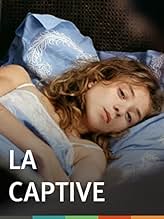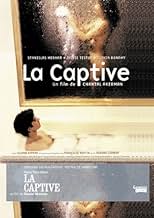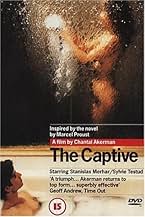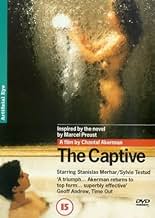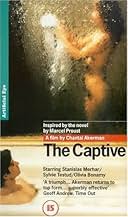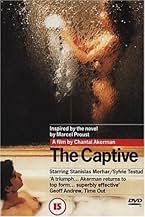La Captive
- 2000
- Tous publics
- 1h 58min
NOTE IMDb
6,0/10
2,3 k
MA NOTE
Une adaptation de La Prisonnière de Marcel Proust (cinquième tome d'À la recherche du temps perdu). Ce conte grave sur un amour tragique et dysfonctionnel se déroule à Paris, en France.Une adaptation de La Prisonnière de Marcel Proust (cinquième tome d'À la recherche du temps perdu). Ce conte grave sur un amour tragique et dysfonctionnel se déroule à Paris, en France.Une adaptation de La Prisonnière de Marcel Proust (cinquième tome d'À la recherche du temps perdu). Ce conte grave sur un amour tragique et dysfonctionnel se déroule à Paris, en France.
- Réalisation
- Scénario
- Casting principal
- Récompenses
- 3 nominations au total
Avis à la une
Having recently discovered French actress Sylvie Testud when I saw The Chateau, I was interested in this film because she's in it. I haven't read the story that the film is supposedly based on so I had nothing to compare it to when I saw it and therefore I went in without any preconceived notions. And with a film like this, a film that doesn't operate on any conventional filmmaking level, that is a very good thing.
This movie doesn't try to tell you what to think or feel about its characters; there is none of the contrivances so common in American movies, none of the manipulation. It just simply presents them and follows them and allows them to do what they do without the camera cutting away too soon for fear that the audience will get bored when there's not a lot "going on" in a scene - in fact some of the best scenes in the film have hardly any movement at all. And this is not done in a self-conscious, 'arty' let's-create-mood sort of way, which makes watching it - or rather experiencing it - even more hypnotic.
This is a film that must be experienced more than once, I would say: you're not really sure what's transpired OR how you feel about what you've witnessed upon a first viewing because it doesn't hit all the 'buttons' that a commercial film is compelled to hit. And Testud is brilliant, managing to imply complexity without demonstrating it (if that makes sense) - she's beyond subtle, beyond sublime.
This movie doesn't try to tell you what to think or feel about its characters; there is none of the contrivances so common in American movies, none of the manipulation. It just simply presents them and follows them and allows them to do what they do without the camera cutting away too soon for fear that the audience will get bored when there's not a lot "going on" in a scene - in fact some of the best scenes in the film have hardly any movement at all. And this is not done in a self-conscious, 'arty' let's-create-mood sort of way, which makes watching it - or rather experiencing it - even more hypnotic.
This is a film that must be experienced more than once, I would say: you're not really sure what's transpired OR how you feel about what you've witnessed upon a first viewing because it doesn't hit all the 'buttons' that a commercial film is compelled to hit. And Testud is brilliant, managing to imply complexity without demonstrating it (if that makes sense) - she's beyond subtle, beyond sublime.
You have to read Proust to appreciate this movie. I imagine it was the most awful, boring treachery to subject someone to if they hadn't read La Captive. Ackerman is actually quite witty in portraying the mental restlessness of the characters, especially Ariane/Albertine constantly being caught in her poorly planned deceptions). In addition to this her visual portrayal of Proust's themes of desire and dissatisfaction are very poignant(although sometimes uncomfortable). An example being the bathing scene, where Simon/Marcel is most vulnerable and unselfishly sensual (I say unselfishly because of the contrast of the other sensual scenes where Ariane is sleeping) but this is only possible for him because of the distance and physical barrier between them. Ackerman is not entirely successful at putting Proust's La Captive on film, but she does make a beautiful, simplified attempt.
At the start I found this film very slow and I think anyone would who did not appreciate its nature before watching it.
It's easy in this one to be put off with the almost entirely gloomy settings, however, they are part of the film and, as you begin to appreciate what the film is actually about, they make a lot more sense.
The film is not about a plot or a story, it is about the people in it. Nor does it tell you what it is about the people that you are meant to see. So this film is very much for the viewer who likes to watch, observe, think and conclude.
You basically get a very slow and moody perspective on a strange(?) boy girl relationship. The interaction between them is never really explained until right up till the end, so it's a case of watching and wondering what is going on between them.
Apparently uneventful, I found myself being slowly drawn into, seduced by, their romance, question being stacked on question till I did really feel a bit frustrated.
However, in the last 30-40 minutes this film suddenly becomes alive and you begin to understand what the point of it was. The point is very poignant and sad and would never have been put across had the earlier 3/4 of the film not been so 'uneventful'.
If you like poetry, you will probably like this film. It has you wondering and speculating right up to the last stanza when you then realise the point of what came before. It is a very sad but beautiful poem.
It's easy in this one to be put off with the almost entirely gloomy settings, however, they are part of the film and, as you begin to appreciate what the film is actually about, they make a lot more sense.
The film is not about a plot or a story, it is about the people in it. Nor does it tell you what it is about the people that you are meant to see. So this film is very much for the viewer who likes to watch, observe, think and conclude.
You basically get a very slow and moody perspective on a strange(?) boy girl relationship. The interaction between them is never really explained until right up till the end, so it's a case of watching and wondering what is going on between them.
Apparently uneventful, I found myself being slowly drawn into, seduced by, their romance, question being stacked on question till I did really feel a bit frustrated.
However, in the last 30-40 minutes this film suddenly becomes alive and you begin to understand what the point of it was. The point is very poignant and sad and would never have been put across had the earlier 3/4 of the film not been so 'uneventful'.
If you like poetry, you will probably like this film. It has you wondering and speculating right up to the last stanza when you then realise the point of what came before. It is a very sad but beautiful poem.
A quiet, intense, low key look at the dysfunctional relationship between a very rich young man and the young woman he 'keeps' at his house. Is she trapped or is he? Who's really the captive?
Not much happens in terms of events, the film is mostly in the details, but those details are great. The two leads give amazingly subtle performances, and the photography and lighting – while never showy – are magnificent. One of the most interesting and effective 'cold' looks I've seen in a film. Beautiful compositions.
A film for those interested in complexity of character, a director using image and mood to tell a story, and patience to allow the slow accumulation of details to add up over time to something very special.
Not much happens in terms of events, the film is mostly in the details, but those details are great. The two leads give amazingly subtle performances, and the photography and lighting – while never showy – are magnificent. One of the most interesting and effective 'cold' looks I've seen in a film. Beautiful compositions.
A film for those interested in complexity of character, a director using image and mood to tell a story, and patience to allow the slow accumulation of details to add up over time to something very special.
Because of its complex and introspective nature, the works of the great French novelist Marcel Proust have been difficult to translate to the screen in spite of some very fine attempts by Raul Ruiz and others. Chantal Akerman's La Captive is no exception. Inspired by the fifth of seven volumes of Proust's epic novel In Search of Lost Time, the film captures the obsessive quality of the relationship between Simon (Stanislaus Merhar) and Ariane (Sylvie Testud) (Marcel and Albertine in the novel), but is unable to project onto the screen the novel's exquisite prose, psychological subtlety, or depth of feeling. While Simon is given a thoughtful treatment, he comes across more as strange and unpleasant than the deeply sensitive, poetic young man of the book.
La Captive begins at home with Simon viewing films of Ariane and some friends during their summer together in Normandy. Repeatedly viewing the footage, he carefully utters the words "I really like you," but it is unclear if the sentiment is his, or if he is vocalizing what he imagines to be the thoughts of his mistress. Set in Paris, Akerman updates the story from its turn of the century milieu and transports it to the modern era with automobiles and well-lit boulevards filled with traffic replacing the horse and carriage. Simon is a somber, well-to-do young man who lives in an ornate Paris apartment with his grandmother (Francoise Bertin), housekeeper Francoise (Liliane Rovére), and girlfriend Ariane (Sylvie Testud).
Though they claim to love each other, each keeps their distance. Ariane lives in an adjacent room and only comes to see Simon when he sends for her in an ongoing ritual. Dialogue is sparse and mostly consists of Simon asking Ariane questions that elicit noncommittal responses such as "if you like," "I can't say," or "you think so?" Mimicking Bressonian models, the actor's facial expressions range from enigmatic to blank, and, aside from some perfunctory kissing, the only time that passion shows up is when Simon rubs up against Ariane's body while she is asleep (or pretending to be). When Simon demands to know what Ariane is thinking, she replies, "If I had any thoughts, I'd tell you—but I don't." Some situations would be comical if they were not sad. As Simon watches Ariane from an adjoining bathroom while sitting in his tub, he tells her how much he admires the odors between her legs and says that if it weren't for his illnesses, he would rather that she would never wash. On another occasion, he probes to find out the number of lies she has told him, insisting that two lies are not enough, he wants at least four. The jealous and insecure Simon has accumulated evidence in his own mind that Ariane is physically attracted to women but it is not made clear (either in the novel or the film) whether his suspicions are real or imagined.
Nonetheless, Simon is preoccupied by the part of Ariane's life that he believes she is withholding from him, following her in an art gallery and physically removing her from a performance of Carmen at the Trocadero out of his fear of her friendship with the actress Lea (Aurora Clément). When Simon is unable to leave the house because of an asthmatic condition, he assigns their mutual friend Andrée (Olivia Bonamy) to track her whereabouts and report back to him. He even goes so far as to question lovers Sarah (Bérénice Bejo) and Isabelle (Anna Mouglalis) about what they think about when they make love.
Although the characterizations in La Captive are very real and quite haunting, the film covers only a small portion of Proust's fifth volume, omitting the colorful characters that make it so special: Charlus, Morel, the Verdurin's, Brichot, and Mme de Guermantes to name a few, and there is no hint of the music, society, and themes of memory, nature, and awareness of time and place that dominate the narrative. Though the pacing is deliberately slow to capture the enigmatic quality of the relationship, the film, while absorbing, is static and does not draw us deeply enough into its mysteries to compensate for its dramatic inertness.
La Captive begins at home with Simon viewing films of Ariane and some friends during their summer together in Normandy. Repeatedly viewing the footage, he carefully utters the words "I really like you," but it is unclear if the sentiment is his, or if he is vocalizing what he imagines to be the thoughts of his mistress. Set in Paris, Akerman updates the story from its turn of the century milieu and transports it to the modern era with automobiles and well-lit boulevards filled with traffic replacing the horse and carriage. Simon is a somber, well-to-do young man who lives in an ornate Paris apartment with his grandmother (Francoise Bertin), housekeeper Francoise (Liliane Rovére), and girlfriend Ariane (Sylvie Testud).
Though they claim to love each other, each keeps their distance. Ariane lives in an adjacent room and only comes to see Simon when he sends for her in an ongoing ritual. Dialogue is sparse and mostly consists of Simon asking Ariane questions that elicit noncommittal responses such as "if you like," "I can't say," or "you think so?" Mimicking Bressonian models, the actor's facial expressions range from enigmatic to blank, and, aside from some perfunctory kissing, the only time that passion shows up is when Simon rubs up against Ariane's body while she is asleep (or pretending to be). When Simon demands to know what Ariane is thinking, she replies, "If I had any thoughts, I'd tell you—but I don't." Some situations would be comical if they were not sad. As Simon watches Ariane from an adjoining bathroom while sitting in his tub, he tells her how much he admires the odors between her legs and says that if it weren't for his illnesses, he would rather that she would never wash. On another occasion, he probes to find out the number of lies she has told him, insisting that two lies are not enough, he wants at least four. The jealous and insecure Simon has accumulated evidence in his own mind that Ariane is physically attracted to women but it is not made clear (either in the novel or the film) whether his suspicions are real or imagined.
Nonetheless, Simon is preoccupied by the part of Ariane's life that he believes she is withholding from him, following her in an art gallery and physically removing her from a performance of Carmen at the Trocadero out of his fear of her friendship with the actress Lea (Aurora Clément). When Simon is unable to leave the house because of an asthmatic condition, he assigns their mutual friend Andrée (Olivia Bonamy) to track her whereabouts and report back to him. He even goes so far as to question lovers Sarah (Bérénice Bejo) and Isabelle (Anna Mouglalis) about what they think about when they make love.
Although the characterizations in La Captive are very real and quite haunting, the film covers only a small portion of Proust's fifth volume, omitting the colorful characters that make it so special: Charlus, Morel, the Verdurin's, Brichot, and Mme de Guermantes to name a few, and there is no hint of the music, society, and themes of memory, nature, and awareness of time and place that dominate the narrative. Though the pacing is deliberately slow to capture the enigmatic quality of the relationship, the film, while absorbing, is static and does not draw us deeply enough into its mysteries to compensate for its dramatic inertness.
Le saviez-vous
- AnecdotesChosen by "Les Cahiers du cinéma" (France) as one of the 10 best pictures of 2000 (#02).
- ConnexionsFeatured in Women Make Film: A New Road Movie Through Cinema (2018)
- Bandes originalesL'ILE DES MORTS, Op 29
Music by Sergei Rachmaninoff
Performed by Koninklijk Concertgebouworkest (as Royal Concertgebouw Orchestra)
Conducted by Vladimir Ashkenazy
© 1909 by HAWKINS & SON (London) LTD
(p) 1984 DECCA RECORDS COMPANY LTD
Avec l'aimable autorisation de UNIVERSAL MUSIC PROJETS SPECIAUX
Meilleurs choix
Connectez-vous pour évaluer et suivre la liste de favoris afin de recevoir des recommandations personnalisées
- How long is The Captive?Alimenté par Alexa
Détails
- Date de sortie
- Pays d’origine
- Langue
- Aussi connu sous le nom de
- The Captive
- Lieux de tournage
- Paris, France(setting of the whole action)
- Sociétés de production
- Voir plus de crédits d'entreprise sur IMDbPro
Box-office
- Montant brut mondial
- 636 $US
- Durée
- 1h 58min(118 min)
- Couleur
- Mixage
- Rapport de forme
- 1.85 : 1
Contribuer à cette page
Suggérer une modification ou ajouter du contenu manquant

